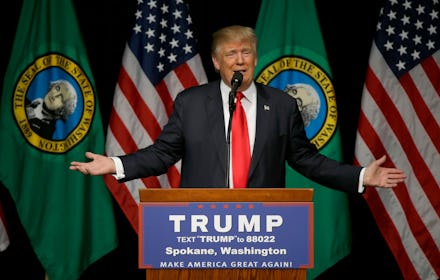Donald Trump Says "I Understand Debt," Immediately Shows He Probably Doesn't

Presumptive Republican presidential nominee and real estate mogul Donald Trump would like you to understand he knows how debt works, thank you very much.
Defending himself Monday against claims his position on renegotiating federal debt repayments is tantamount to a default on the U.S.' sovereign debt, Trump told CNN's Chris Cuomo on New Day, "People said I want to go and buy debt and default on debt, and I mean, these people are crazy. This is the United States government."
"First of all, you never have to default because you print the money, I hate to tell you, OK?" he continued. "I said if we can buy back government debt at a discount, in other words, if interest rates go up and we can buy bonds back at a discount — if we are liquid enough as a country, we should do that. In other words, we can buy back debt at a discount."
Trump said he understands debt "better than probably anybody. I know how to deal with debt very well. I love debt — but you know, debt is tricky and it's dangerous, and you have to be careful and you have to know what you're doing."
Some of what Trump said falls in line with modern monetary theory, the view adopted by some left-wing economists that countries with their own currency can and should run eternal deficits, even during boom times, to spur the economy. MMT basically supports Trump's position on debt buybacks.
But as Vox's Dylan Matthews noted, the real reason Trump might be adopting this standpoint isn't necessarily because he wants to use the money to invest in infrastructure, federal agencies or entitlements, like progressives who buy into modern monetary theory — it's possibly because his budget calls for $9.5 trillion in tax cuts. Those cuts would massively benefit the already wealthy, making them highly regressive.
Then the whole thing is further reliant upon Trump's ability to strike such a good deal that the buyback would get the U.S. out of debt. Even that is assuming the scheme works rather than triggering inflation, as mainstream progressive economists like Paul Krugman theorize.
In effect, what Trump is effectively advocating may be a giant handout to the rich paid for with an enormously risky attempt to underpay on sovereign debt. So there's a reason Trump's understanding of debt and spending has raised the hackles of progressive and conservative commentators alike — it certainly isn't one that either party feels comfortable endorsing.
On the other hand, since Trump has been so inconsistent on so many of his policy positions (he recently said tax cuts for the rich might end up on cutting room floor after negotiations with Congress), it might be a mistake to take anything he proposes as a serious plan. Rather, he's probably just spitballing to see what sticks with various audiences.
The other possibility is that he's a radical genius about to usher in a modern revolution in economics... and if voters believe that, there's probably a casino somewhere Trump wants to sell them, too.